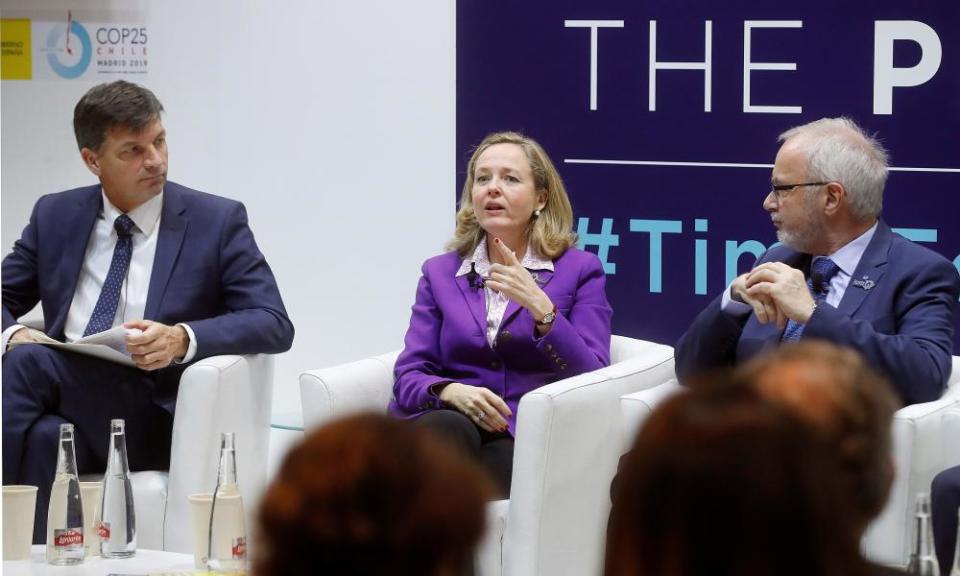Angus Taylor sidesteps Australia’s carryover credit plan at UN climate talks

Angus Taylor has touted investments in technology as central to fighting climate change in Australia’s official address to UN climate talks, but sidestepped the country’s controversial plans to use a carbon accounting loophole to slash its Paris climate target.
The emissions reduction and energy minister told the world’s governments gathered in Madrid that the Paris climate agreement “sent a powerful signal to the world that countries are serious about climate action.”
During the speech, Taylor did not raise Australia’s controversial plans to use 411m tonnes of CO2-equivalent credits from the previous Kyoto targets against the government’s newer Paris commitment.
Angus Taylor tells #COP25Madrid Australia is on track to ‘meet and beat’ its Paris and Kyoto targets but sidesteps Australia’s controversial plans to use a carbon accounting loophole to slash its climate targets. More on this with @readfearn here: https://t.co/Nfk0Ou32g8 #auspol pic.twitter.com/TALALnyKlw
— Guardian Australia (@GuardianAus) December 11, 2019
Under Kyoto, Australia was one of few countries to negotiate a target that allowed an increase in emissions, allowing it increase emissions by 8% between 1990 and 2012.
One of Taylor’s key tasks this week in Madrid is to fight off a challenge from about 100 countries that want to ban the use of the carryover credits. The issue remains unresolved after another day’s talks.
Related: About 100 countries at UN climate talks challenge Australia's use of carryover credits
Taylor said: “Australia is committed to the Paris agreement. We are already on track to meet and beat the target we have set for 2030, just as we are meeting and beating our Kyoto targets.
“On recently released forecasts we expect to beat our 2020 targets by 411m tonnes, which is around 80% of a full year of emissions.”
Later in the speech, Taylor’s only reference to the negotiations came when he said said final rules under the Paris agreement must “give us confidence that traded carbon units represent genuine emissions reductions.”
Australian government officials have said they are unaware of any other country planning to use the carryover loophole to reduce its Paris 2030 target. Using the loophole would see Australia’s target of a 26% cut below 2005 effectively cut to 16%, analysts have said.
Sign up to receive the top stories from Guardian Australia every morning
Taylor said “strong messages and targets alone” would not address climate change, “no matter how ambitious”.
“The world needs action to reduce emissions and Australia believes technology is central to achieving this. We can only reduce emissions as fast as the deployment of commercially viable technologies allow.”
He said Australia was developing a “technology investment roadmap” that would drive “low-emissions technology investment”, and pointed to a new national hydrogen strategy as an example.
Taylor also announced Australia had joined the UN’s new Leadership Group for Industry Transition, which asks member governments to “work towards accelerating transition of all industry sectors to low-carbon pathways.”
Australia provided an “important perspective”, Taylor said, “as one of the world’s biggest and most trusted energy suppliers.”
He promoted record high investments in renewable energy, increasing levels of renewable electricity into power networks, and “the world’s highest uptake of household solar panels” as major Australian achievements.
Related: Scott Morrison and the Coalition are fiddling as Australia burns | Katharine Murphy
But on household solar, he said the boom “has not been without issues” and Australia’s challenge was to “ensure energy remains affordable and reliable”.
Taylor’s speech came on the same day the Climate Change Policy Index, released annually since 2005, ranked Australia as the sixth worst country on climate change.
The index tracks government’s achievements across four categories – emissions, energy use, renewable energy and climate policy. It is produced by thinktanks Germanwatch and NewClimate Institute, and the Climate Action Network of environmental groups.
Sweden topped the rankings, followed by Denmark and Morocco.
In a statement, the groups said: “Australia, Saudi Arabia and especially the USA, give cause for great concern with their low to very low performance in emissions and renewable energy development, as well as climate policy.
“With these three governments massively influenced by the coal and oil lobby, there are hardly any signs of serious climate policy in sight.”

 Yahoo News
Yahoo News 